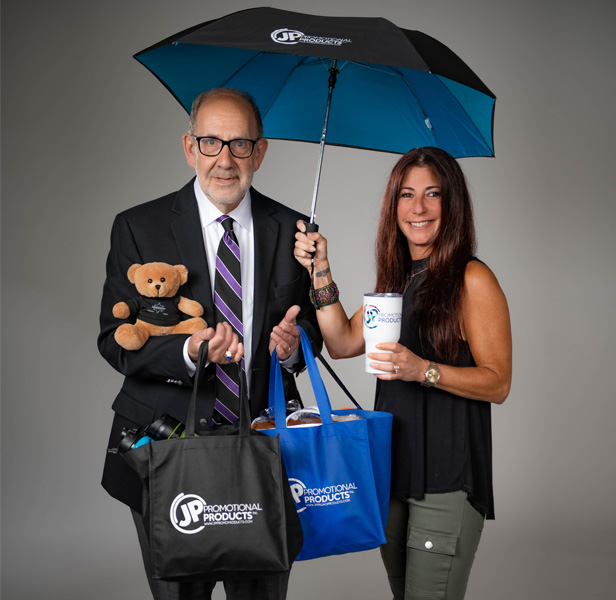May 31, 2023
The Bright Side: JP Promotional Products Celebrates 20 Years
The distributor in the Hudson Valley first offered fulfillment services for items as varied as TV parts and tea.
As Ossining, NY-based JP Promotional Products (asi/232668) celebrates two decades of business this month, Chairman Robert Rosenthal reflects on a time when his future in the industry wasn’t certain.
After working in finance at a division of food company Sara Lee (known at the time as Consolidated Foods Corp.) in Queens, NY, Rosenthal, a CPA by training, joined a direct marketing distributor called Union Pen. It was a small company at first, and Rosenthal helped grow it to 175 employees. The firm mailed product catalogs and small items like pens and keytags imprinted with recipients’ names as a type of self-promo. In 2000, Rosenthal purchased the business.

Robert Rosenthal and Shari Pulver, JP Promotional Products
But the next year brought significant challenges that no one could have foreseen. Immediately after the terrorist attacks of Sept. 11, 2001, the government prohibited any planes to fly in U.S. airspace for several days. That meant that first-class mail, initially slated to be flown, was loaded onto trucks for ground delivery and whatever had been on the trucks was trashed – including hundreds of thousands of direct mail pieces from Union Pen. It was approximately $1 million worth of investment simply thrown away.
Just a week later, the country was further traumatized when letters containing anthrax started showing up at media outlets in New York and Florida, and then in a few senators’ mailboxes. Seventeen people developed infections, and five died. Unfortunately, Union Pen also got caught up in the situation – among the items they had been mailing out at the time were small mint tins. When some were accidentally crushed in transit, they arrived at their destinations as white powder. While there was no lengthy investigation of Union Pen’s inventory, it was yet another blow to the company’s direct mail investment. Not long after, Rosenthal decided to sell Union Pen to another industry supplier.
He leased two small offices to figure out his next move, and not long after, his daughter Shari Pulver, who had been working in sales at another small distributor, showed up with a box of her things from the office, telling her dad she had quit.
“I told her, ‘Well, we’re not bringing in any revenue,’” says Rosenthal. “We started with nothing, not one customer. But we began offering fulfillment for people in our network, including TV components and pallets of tea. They would send everything to our offices.”
When the amount of inventory to be shipped became too much for the rented space, Rosenthal obtained a local self-storage unit to work out of. “I’d say, ‘Sure, send the items to my warehouse,’ which was actually the storage unit,” says Rosenthal. “Clients would say, ‘You have quite an operation there,’ but it was just Shari and me. Fulfillment paid the bills in those days.”
In May 2003, Rosenthal and Pulver – now the company’s president and “a good closer,” says Rosenthal – decided to establish their small distributorship with a focus on promotional products. And while Rosenthal had helped grow Union Pen to 175 people, he’s kept this company lean; in addition to Rosenthal and his daughter, they have just one part-time outside sales rep and an administrative assistant to support business with customers of all sizes.
A few years ago, Rosenthal and his daughter were asked to present at the meeting of a former IBM group that encouraged large companies to do more business with smaller enterprises. “We landed a couple Fortune 500 accounts afterwards,” he says. “Then, we started working with a major biotech company, then a large local hospital – we still do all their scrubs and send them to employees through their company store that we manage. It’s a pretty good mix of large and small clients. And these days it’s mainly referrals. They just keep coming in.”
While other companies struggled during COVID, Rosenthal says their company did well – in spring 2020, they leveraged healthcare contacts to source critical PPE for local government use. Rosenthal even provided his insights in early summer of that year for ASI Media’s Big Markets coverage on the Healthcare sector. Meanwhile, their Fortune 500 clients asked them to put together kitted gift bundles for employees working at home. Fortunately, the fulfillment process was nothing new since they had been handling those types of requests for nearly 20 years.
Rosenthal and Pulver continue to land new accounts, mainly through referrals. In recent weeks, they’ve received an anniversary recognition plaque from the town of Ossining. They’ve also designed a special 20th anniversary logo and are offering specials now through the end of June.
While there were opportunities over the years to expand the team and the space, Rosenthal and Pulver have deliberately stayed small and limited overhead while successfully maintaining the presence of a much larger firm – they make themselves available 24/7 and never tell a client no, says Rosenthal. They’re able to finance larger orders; they have offices, a conference room and a showroom in Ossining; and they’ve partnered with a nearby warehouse to continue offering fulfillment services.
“It’s the presence, the look,” he says. “I always wear a tie at meetings. It’s an attitude that we’re a big business.”